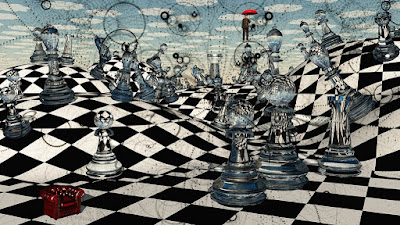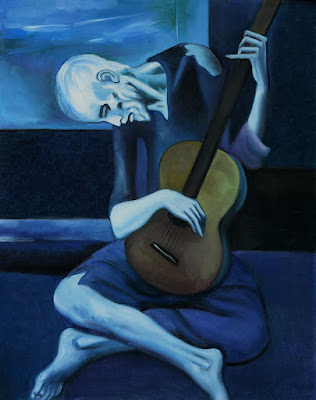(This particular blog was written as a supplement to the entire text of "The Waste Land" by T. S. Eliot, complete with summaries and analysis of each of the five sections. All of this was added to a print by Blookup of my further ramblings on various other subjects; first to lengthen a sparse text ["never mind the quality, feel the width"] and second as an attempt to add gravitas. Only this blog is assessible online, but it does "stand alone" - if "stand" is the correct word!)
The Waste Land begins with a line that is very well known, that "April is the cruellest month". Normally April is associated with Spring, renewal; why should it be "cruel"?
What is there to renew and what will effect any renewal? For T S Eliot and many of his own generation, the answer was in the balance. Old ways, old forms of all artistic expression were dated beyond redemption, expressing a world that was gone. Swept away in part by the Great War and its carnage, obliterating the thought and hope of a natural human progress toward "perfection". No longer was the earth at the centre (Copernicus), no longer was "man" a special creation (Darwin), each found themselves alone. They sought meaning beyond the poetry of rural scenes, the art of classical and biblical events, of "important" people pictured upon a horse or throne, above the crowd.
The poem of W B Yeats, "The Second Coming" sets the scene and asks a few questions:-
Turning and turning in the widening gyre
The falcon cannot hear the falconer;
Things fall apart; the centre cannot hold;
Mere anarchy is loosed upon the world,
The blood-dimmed tide is loosed, and everywhere
The ceremony of innocence is drowned;
The best lack all conviction, while the worst
Are full of passionate intensity.
Surely some revelation is at hand;
Surely the Second Coming is at hand.
The Second Coming! Hardly are those words out
When a vast image out of Spiritus Mundi
Troubles my sight: somewhere in sands of the desert
A shape with lion body and the head of a man,
A gaze blank and pitiless as the sun,
Is moving its slow thighs, while all about it
Reel shadows of the indignant desert birds.
The darkness drops again; but now I know
That twenty centuries of stony sleep
Were vexed to nightmare by a rocking cradle,
And what rough beast, its hour come round at last,
Slouches towards Bethlehem to be born?
Turning and turning in the widening gyre
The falcon cannot hear the falconer;
Things fall apart; the centre cannot hold;
Mere anarchy is loosed upon the world,
The blood-dimmed tide is loosed, and everywhere
The ceremony of innocence is drowned;
The best lack all conviction, while the worst
Are full of passionate intensity.
Surely some revelation is at hand;
Surely the Second Coming is at hand.
The Second Coming! Hardly are those words out
When a vast image out of Spiritus Mundi
Troubles my sight: somewhere in sands of the desert
A shape with lion body and the head of a man,
A gaze blank and pitiless as the sun,
Is moving its slow thighs, while all about it
Reel shadows of the indignant desert birds.
The darkness drops again; but now I know
That twenty centuries of stony sleep
Were vexed to nightmare by a rocking cradle,
And what rough beast, its hour come round at last,
Slouches towards Bethlehem to be born?
Slouches towards Bethlehem to be born?























































